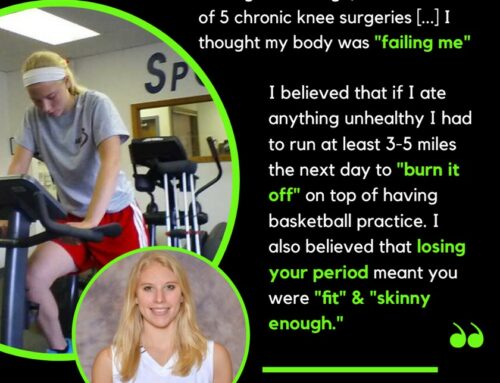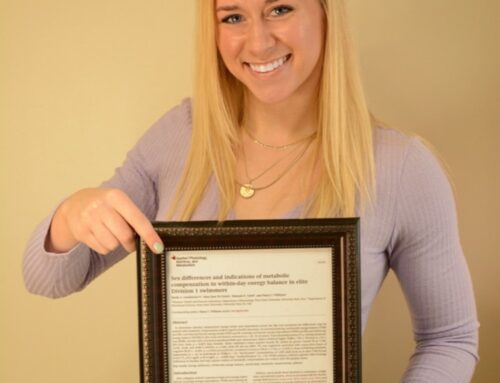For the Compulsive Exerciser: Food for Thought
If you are a compulsive exerciser, the story below might inspire you to add some gentleness to your day. “Invisible Victories” is from the MEDA newsletter (www.MEDAinc.org). MEDA is the Multi-service Eating Disorders Association, a helpful resource for people who struggle with balancing food and weight.
“Invisible Victories” By Whitney Post, former World Champion and Olympic Rower www.thebodyself.com
We live in a culture that is always looking for the shiny accomplishment. We are taught to be good, to look good, and to achieve more-and it never seems to end. Yet I have found over and over again that the tasks and achievements that are most in line with my recovery are invisible, humble acts that won’t take up space on my resume and that I probably won’t want to tell anyone about at a cocktail party. Each month in this column I will celebrate an invisible victory that I or one of my clients has accomplished. My hope is that it will help you be better able to spot and celebrate your own.
I want to thank Rachel Bikofsky, our May 2010 Invisible Victory Contest winner for sharing her strength and growth in this essay about the Boston Marathon. I believe it belongs on the medal stand because it articulates something so many of us feel when we see high level athletes, or witness events we think our “perfect” or “preferred” selves should be participating in. The victory here comes in accepting her own body’s truth about what is right and balanced, and releasing old ideas of who she should be.
My Invisible Victory – by Rachel Bikofsky
Today was the 114th Boston Marathon, and I didn’t run it. Nor did I run the 113th, or the 112th, or any marathon ever, at any time. Every year in recent memory, I have used Marathon Monday as an excuse to berate myself endlessly for my lack of strength and discipline-obviously, if I possessed those qualities, I’d be running. So this year, as the big event loomed once more, I approached it with my usual sense of trepidation…and was pleasantly surprised to be greeted not with self-hatred, but with acceptance and clarity. Here’s what I know:
I did not run the Marathon, and this used to mean that I was weak. But, I know I’m not weak, because I wake up at 5:45 every morning, get to work an hour later, and have energy enough to shepherd 25 rambunctious third graders through a full day of learning, five days a week.
I did not run the Marathon, and this used to mean I was undisciplined. But, I know I’m not undisciplined, I just save my discipline for things that matter to me, and running doesn’t. I work hard, I study meticulously, I make to-do lists and schedules and stick to them. If I set a goal, I do my best to meet it, and I’m pretty sure that’s what discipline is about.
I did not run the Marathon, and this used to mean I’d never have the body I wanted. Well, it does mean I’ll never have a marathoner’s body, but it doesn’t have to mean I’ll never have a body I’m satisfied with. Also, it probably means for me I’ll have a better chance of keeping my period, and won’t have to endure the pain of running with stress fractures in my feet ever again. It means I’ll be gentler with my body, and my body and spirit will reflect that.
I did not run the Marathon, and this used to mean I’d never get medals or have people cheer for me. Okay, so it probably does eliminate one possible avenue for medal winning. But last week, one of my students presented me with two tiny origami swans he had made for me in art class. Better than a medal? It was for me.
I did not run the Marathon, and this used to mean I had no worth. While it’s true that I’m not a runner, I am a person who stops to touch wildflowers and exclaim over nature, who is intuitive to the needs of others, who loves her family, and who can soothe a crying child. I am a thinker, a writer, and a person with a wicked sense of humor. I am all of those things, so I can also accept what I am not. What not running the Marathon means is simply that I am not a marathon runner-and there is no longer a value judgment attached to that statement. It’s neither good nor bad, it’s just what is. And, I’m finally, finally okay with that, or at least more okay than I’ve ever been before. I did not run the race, or win a medal…., but I have earned an invisible victory, and I think the 114th Boston Marathon has been my best one yet.
If you don’t like to spend your calories by drinking milk….
Many of my clients like to save calories by taking a calcium pill instead of drinking milk. While they may think that is a reasonable alternative, I disagree. Yes, a calcium pill does offer a lower calorie alternative to consuming the recommended three (8-ounce) glasses of milk or yogurt each day, but research indicates milk drinkers tend to be leaner than milk avoiders. I encourage my clients to embrace milk as a “liquid food” that is satiating and curbs one appetite. That is, milk can be more filling than the same number of calories from soda or juice. Drinking a glass of milk with a meal can fill you up, as opposed to drinking water and then be left hankering for dessert (with far more calories than a glass of milk).
Most of my active female clients reduce weight on 1,800 calories; men on 2,100+ calories. That breaks down to 500 to 600 calories per meal (breakfast, lunch, dinner) and 300 calories for a snack. Enjoying low-fat (soy) milk on cereal, a mid-morning latte and a yogurt for a snack seems a powerful way to spend 300 of those calories and approach the recommended intake of 1,000 milligrams of calcium per for adults 19-50 years; 1,200 mg for adults older than 50 years, and 1,300 mg for kids 9-18 years. If you are a parent, be a role model and drink milk at dinner to encourage a calcium-rich intake for your kids. Building strong bones during the ages of 10 to 18 is a wise investment for the future. Milk offers far more than just calcium; it’s a rich source of vitamin D, protein, riboflavin and a host of life-sustaining nutrients. Think twice before trading this wholesome food for a calcium pill.
Information provided by Nancy Clark, MS, RD CSSD (Board Certified Specialist in Sports Dietetics), Chairperson of the Nutrition Committee of the Female Athlete Triad Coalition. Nancy Clark counsels active people at her private practice in Newton, MA (617-795-1875). For more information, read her popular Sports Nutrition Guidebook and food guides for new runners, marathoners, soccer players and cyclists, available via www.nancyclarkrd.com.






